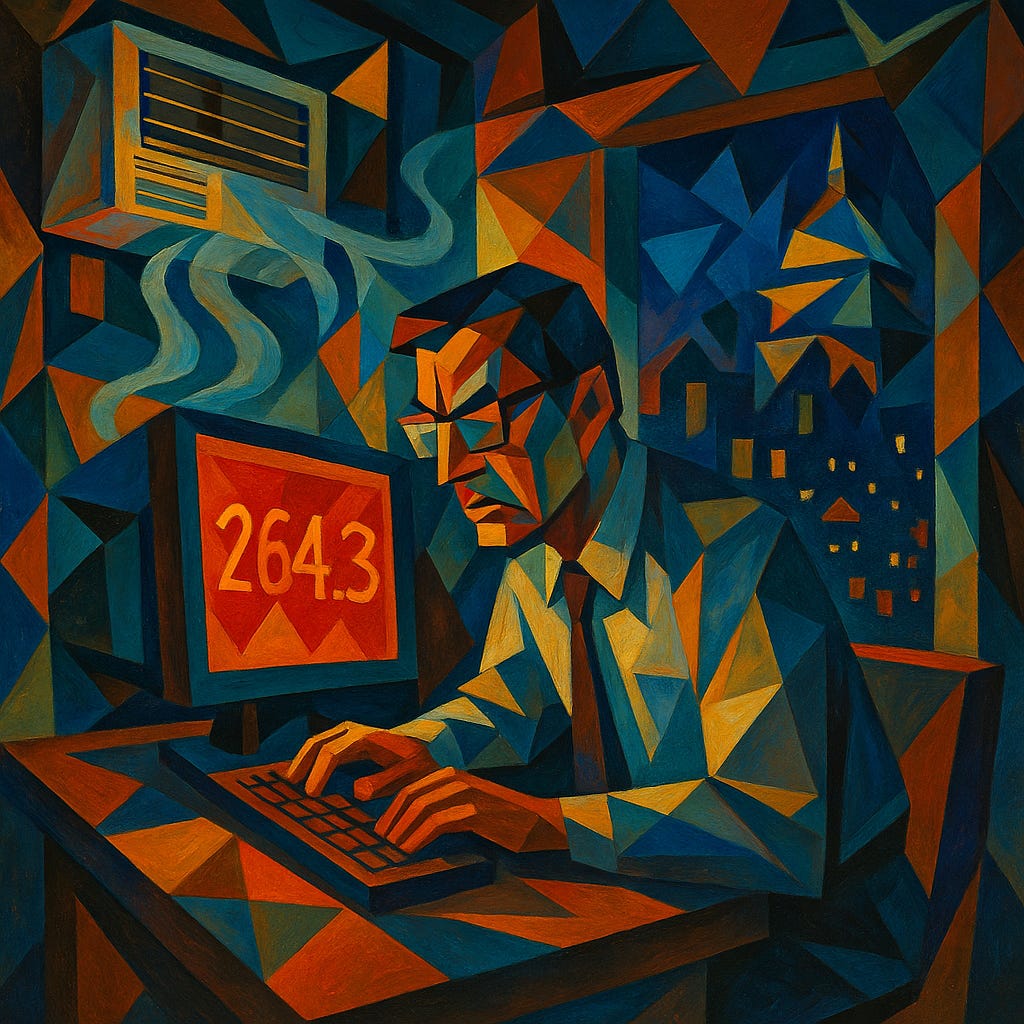$150 Billion For War With China
The Budget. 950 words, 3 minute read. With Gemini.
The ancient air conditioner in Ron’s Treasury office gave a rattling sigh, emitting a weak stream of cool air that did little to combat the heavy, suffocating cloak of D.C.'s August heat pressing in from outside. Below his window, the city lights glittered, oblivious. On his screen, the numbers told a different story – yields from yesterday’s Treasury auction were higher than projected, again. Borrowing costs were creeping up, a slow financial strangulation.
He saw a news alert crawl across a secondary monitor: "...ratings agency warns US outlook remains negative citing ballooning debt servicing costs..." Default wasn't just a forecast; it was a shadow stretching across the sunlit Mall outside.
Ron rubbed the tight knot forming behind his sternum. And in the morning, General Sterling would arrive, wanting to pour gasoline on the fire.
Committee Room 3B felt like a hermetically sealed capsule, smelling faintly of stale coffee and floor wax. The air conditioning here worked, almost too well, creating a chill that felt unnatural against the simmering heat outside. Ron watched Julius Sterling enter, navigating the room with the low-gravity confidence of a man who moved easily between Pentagon briefings and defense contractor boardrooms. Immaculate, poised, radiating certainty. He placed a binder, thick as a city phonebook and bound in navy blue, on the polished table. Its title, embossed in gold: "Projecting Stability: The Defense Augmentation Imperative."
"Ron," Julius greeted, his voice modulated, resonant. "Good of you to prioritize this. The intelligence coming out of the East China Sea is… sobering."
Ron gestured towards the binder, skipping the pleasantries. "The figures coming out of Treasury are sobering too, Julius. Yesterday’s T-bill auction…"
Julius waved a dismissive hand, a gesture meant to appear reassuring. "Precisely why we need to project strength, Ron. Stability follows security. Always." He tapped the binder. "$150 billion. A strategic reinvestment."
"A strategic expenditure we finance how, exactly?" Ron countered, his voice quiet but sharp. "The markets are flashing warning signs. Servicing our existing debt is already projected to cost more than..."
"Details," Julius interjected smoothly, "for later. First, consider the naval component. $33.8 billion. Their fifth carrier group is ahead of schedule. Their submarine deployment frequency…" He leaned forward. "We need those hulls in the water, Ron. Bath Iron Works, Newport News – this isn't just about projecting power, it's about maintaining critical industrial capacity, skilled labor."
"Labor paid for with bonds we might struggle to sell at reasonable rates," Ron shot back. "And the main event? Golden Dome?"
A spark ignited in Julius’s eyes. "Phase One. $24.7 billion. Think of it, Ron – a near-total shield against ballistic threats. Layered kinetic kill vehicles. It neutralizes coercive missile diplomacy overnight."
"Twenty-five billion dollars," Ron said, letting the number hang in the air. "That's almost exactly what we couldn't find for the national infrastructure upgrade last year, Julius. Roads, bridges, the power grid. You're asking me to fund a 'shield' – based on notoriously complex tech with a spotty track record – by borrowing money at rates that could cripple us, while the foundations crumble right here at home?" He thought of the 'sky-high' promises of past programs, billions vaporized on cancelled projects. "Not to mention the restock order. Munitions, spares… enough, as one analyst put it, to fight a hypothetical war on three fronts simultaneously."
The cool air in the room seemed to crackle with the opposing energies. Julius doubled down, his arguments laced with classified assessments, projections of adversary timelines. "Their hypersonic program is accelerating, Ron. We can't afford parity; we need overmatch. This isn't a choice between guns and butter; it's a choice between security and vulnerability! We found the money during the Cold War, didn't we? We found it after 9/11. When national survival is at stake, the resources materialize."
The casual certainty of that last statement – the resources materialize – sent a chill down Ron’s spine colder than the room's air conditioning. "The world has changed, Julius," he snapped, leaning forward himself, his voice tight. "The global debt market isn't the blank check it used to be. Our debt-to-GDP ratio isn't Cold War levels. 'Materializing resources' now means paying punishing interest rates that crowd out everything else, or risking a catastrophic loss of faith in U.S. credit! That’s national suicide, not national security!" He felt the blood pounding in his temples.
The sheer disconnect – Julius talking about hypersonic threats while Ron stared daily into the abyss of potential financial contagion – was staggering. It was like arguing physics with someone who refused to acknowledge gravity.
Julius regarded him with a look that was almost sympathetic, the look of a man explaining harsh realities to someone tragically naive. "Fiscal discipline is important, Ron. Absolutely. But it doesn't stop a missile launch. Some threats simply have to be met, regardless of the current balance sheet. Strategy dictates the budget, not the other way around."
The meeting broke apart, the chasm between their positions unbridged. Julius gathered his pristine binder, the emblem gleaming under the fluorescent lights. "The Hill understands necessity, Ron. They understand the threat landscape. Numbers follow strategy." He gave a final, decisive nod and exited, leaving Ron alone in the chilled, silent room.
Ron stayed seated, the heavy binder remaining on the table like an unexploded ordnance. He looked out the window, past the manicured lawns, towards the distant Washington Monument. Tourists milled about below, taking photos, blissfully unaware of the high-stakes gamble being discussed in rooms like this, the tension between protecting them from perceived foreign threats and protecting them from the slow-motion implosion of their own economy. The air conditioner kicked back on with a low hum, but the room suddenly felt oppressively close. He had stared into the fiscal abyss, and Julius had offered him… a $150 billion anchor.


